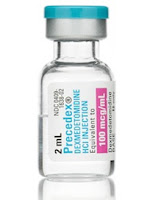 The launch of a generic of a key product in the U.S. always makes a sales organization uneasy because it inevitably means layoffs. But the last thing any sales team wants to hear is that its boss will have to lay off pretty much everyone if a generic comes to market. Yet that is what Hospira told a court is in store if it doesn't block copies of its sedative Precedex. And the court listened.
The launch of a generic of a key product in the U.S. always makes a sales organization uneasy because it inevitably means layoffs. But the last thing any sales team wants to hear is that its boss will have to lay off pretty much everyone if a generic comes to market. Yet that is what Hospira told a court is in store if it doesn't block copies of its sedative Precedex. And the court listened.
Hospira ($HSP) filed suit against the FDA Tuesday for allowing limited-use generic versions of the drug onto the market ahead of a patent expiration, Reuters reports. It said in its suit if the court doesn't issue a temporary restraining order against the launch of any versions it will lose tens of millions of dollars and have to lay off its entire brand sales group in the U.S.
And U.S. District Judge Jarrod Hazel in Maryland agreed to do just that, today, issuing a TRO, Reuters reported. He said Hospira was likely to win its case because the FDA was changing the rules in this case and that could undermine people's belief in the system.
The suit says the FDA has approved a version from Par Sterile Products, and today Mylan ($MYL) announced it too has gotten a thumbs up from the FDA. Sterne Agee analyst Shibani Malhotra says there are 5 versions circling Hospira's product and estimates the launches could whack about 20% of its share price. She estimates Precedex contributed approximately $320 million in global sales last year, and $221 million, or 14.6% of the drugmaker's profits. Hospira doesn't break out the sales numbers but said that Precedex last year accounted for 11% of global sales and 17% of its U.S. sales.
The litigation pivots on the FDA's decision to allow a "carve out." As Reuters points out, Precedex is approved for use both as a sedative for respirator patients in intensive care units and for sedating patients for surgery or other procedures. Hospira has a patent on the intensive care unit sedation. The FDA Monday said it was legal for it to allow other drugmakers to launch generics if the FDA doesn't grant them an indication for the ICU use. But Hospira argues that its patent covers both uses and that the FDA is violating its own practice of not allowing a generic drug when it partially infringes on a patented use.
Malhotra points out that the carve out means the copies could not be sold as direct substitutes, only the limited use, but since it is sold primarily to hospitals, which are very cost conscious, the analyst expects most would make the switch for that use to save some bucks.
The thing is, generics were on the way soon. In its annual report, Hospira said it last year settled patent litigation with Sandoz, the generic arm of Novartis ($NVS), allowing it to bring out a generic by December of this year. The fight also comes as Hospira is reportedly already looking for ways to save money. It is said to be in talks to buy the medical nutrition business of France's Danone and use it as a vehicle to do a tax-cutting inversion as a way to cut its tax bill.
The court can be expected to decide quickly whether to issue the TRO and so Hospira sales reps won't have to hold their breath long before knowing how soon the ax might fall.
- here's Hospira's SEC filing
- read the Reuters story and here
- here's the Mylan release